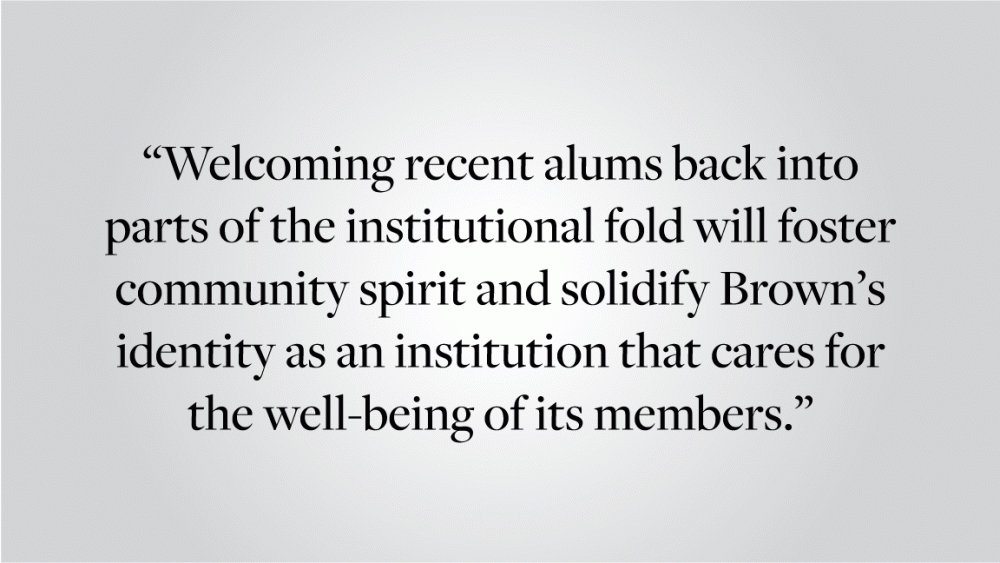As the University returns to COVID-19 Campus Activity Level 1, current students once again cannot access many of the campus resources that make a Brown education such an asset in the professional world. For those of us who never expected our last semesters at Brown to be taught remotely, entering the workforce is considerably daunting. In order to accommodate for the time in which students have lost access to many of Brown’s on-campus resources, and to better assist us in transitioning into the workforce in a uniquely difficult era, the University should extend our access to such services as the Brown Design Workshop and the University’s software catalogue beyond graduation.
Neither the University nor its students can fully make up for the time that we have lost, which is all the more reason why Brown should extend flexibility and support to its students after graduation in ways that it hasn’t done before. Brown alums have continued to have access to University services such as CareerLAB and BrownConnect, which serves as a precedent for how Brown can further support recently graduated students with institutionally-funded programs. Both of these services assist students in their transition to life after Brown, which is an asset both for alums who need work and for the University, which profits from its alums’ prosperity as well as its reputation for creating successful workers. When Brown alums continue to succeed year after year, the University maintains its reputation and is able to stay relevant as an institution while the greater society progresses. Similarly, providing extended access to other resources on campus should be viewed as a mechanism to support student success after Brown, especially during such exceptional circumstances.
It’s no secret that currently enrolled students are paying for services that they cannot receive. Access to buildings, libraries and facilities is maintained partly with the income from tuition, but all students, whether studying remotely or on campus, have not had the same open and easy access to these spaces since March 2020. For those of us who are seniors, we have lost time and opportunities which we have paid for and will not get back during the remainder of our time at Brown. Of course, for the brief period in which the University held COVID-19 Campus Activity Level 2, many spaces such as the Nelson Fitness Center and the Brown Design Workshop offered limited access to students in Providence. However, considering the dramatic reduction in hours, occupancy limits, understaffing and either reduced or eliminated educational programming like workshops, it’s impossible to claim that these services have had their intended impact on Brown students over the past nine months. What’s more, students who have chosen to study remotely have even less opportunity to take advantage of such resources and services.
To partially remedy the lost time, it seems most fair and equitable to extend access to as many of these types of resources as possible for those of us who won’t be here once full access resumes. For many of us, a core component of our Brown experience and education involved taking advantage of resources such as the Brown Design Workshop, which require in-person attendance and hands-on training. It is a prime example of a service that provides students with expensive materials and equipment that can be difficult to invest in as an individual exploring new interests. To be sure, the BDW requires maintenance and training, and is therefore expensive for the University to offer. If Brown finds that it is out of the question to let recent alumni access the BDW for free, the least that they can offer us is an affordable membership program for the few alums who stay in Providence after graduating.
Given that graduating students will be entering a dismal job market and facing a slow recovery from the economic downturns brought on by the pandemic, Brown needs to invest in its students as they face the long and daunting process of finding work in their field. To some, putting their best foot forward means maintaining their technical skills and portfolios using programs accessed through Brown’s Software Catalogue. STATA, Adobe Creative Cloud and Microsoft Office are just some of the many programs Brown offers students while they are enrolled that they may not be able to afford otherwise. Programs like these profit off of expensive subscription models that Brown renews annually for its community, and that students need to access in order to share the content that they created during their time at Brown. While students have certainly been able to maintain access to these services throughout the pandemic, extending our access beyond graduation would be a helpful gesture from the University to acknowledge the recent shortcomings in our college experiences and the particular difficulties many of us will face upon graduating.
By the time it is safe for us to return to campus en masse, many members of the Brown community will have finished their undergraduate careers and will be well on their way to the next chapter of their lives. Welcoming recent alums back into parts of the institutional fold will foster community spirit and solidify Brown’s identity as an institution that cares for the well-being of its members. Post-secondary education as we know it is bound to see many changes over the next few years, and if Brown plans to maintain its reputation, it needs to make its services more accessible.
Beth Pollard ’21 can be reached at beth_pollard@brown.edu. Please send responses to this opinion to letters@browndailyherald.com and op-eds to opinions@browndailyherald.com.

ADVERTISEMENT




